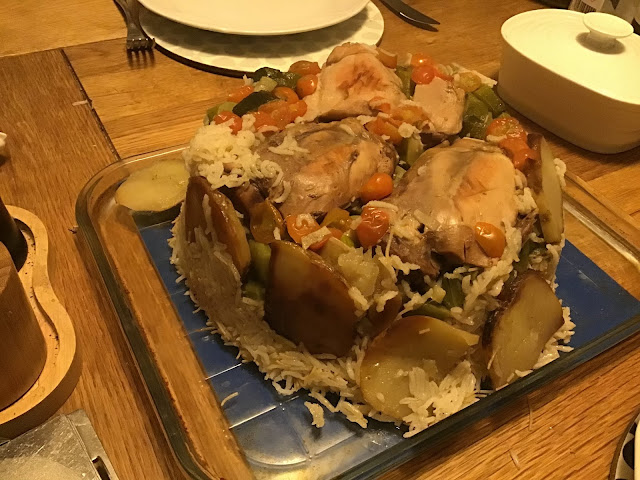Maklubeh
PREPARATION
(1) Boil the meat. This can be lamb or chicken. If it is chicken, some people fry it first and boil it for a shorter time. Other people just boil it.
Include salt and spices with the meat as it boils. The spices are nutmeg, turmeric, black pepper, cardamom, cinnamon though in Palestine it is possible to get ready-mixed spices for maklubeh. Also include onion.
When the meat is boiling, go on to the other stages. When the meat is ready, separate it from the liquids but *keep this stock, it is what gives the taste to the whole dish.*
(2) Cut and fry the vegetables. These can be cauliflower and potato that Fathiyeh uses, or aubergines and carrots that Im Shadi uses.
(3) Wash and soak the rice for twenty minutes or half an hour. Drain it.
(4) If you like to you can fry vermicelli and stir it in to the rice when it has been soaked.
COOKING THE MAKLUBEH
(5) Put rings of tomato and pieces of garlic and maybe some rice at the bottom of a big pan - this will stop it sticking, too.
(6) Make a layer of cooked meat.
(7) If you are using potato, put it in a ring round the edges, and fill with a layer of vegetables.
(8) Put the rice (or rice and vermicelli) on top.
(9) Pour in the stock and if necessary add water to cover the rice by about two finger-joints.
(10) Cover tightly.
(11) Put on the gas: bring to the boil and turn down low. Cook until the liquid has gone - you can test this with a knife to see it has all gone. If you are a bit short of liquid and the rice needs more, you can add a bit of warmed water.
(12) While it is cooking you have time to make a Palestinian salad of finely-chopped tomatoes, cucumber and maybe parsley or mint. Season with salt and lemon.
(13) Turn the cooked maklubeh out on to a large round tray - it should stand firm.
(14) Serve with yoghurt and salad. SAHTAIN!


Comments
Post a Comment